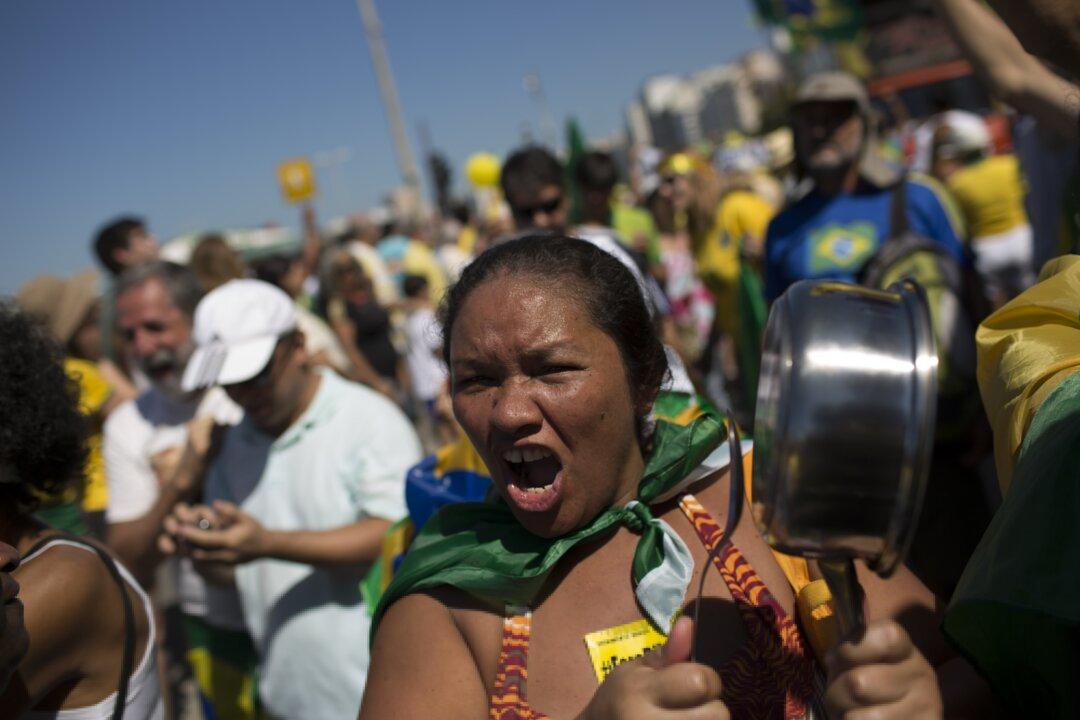SAO PAULO—Brazilians took to the streets of cities and towns across the country Sunday for anti-government protests being watched as a barometer of discontent with the increasingly unpopular President Dilma Rousseff.
The demonstrations assailed Rousseff, whose standing in the polls has plunged amid a snowballing corruption scandal that has embroiled politicians from her Workers’ Party as well as a sputtering economy, a weakening currency and rising inflation.
In Sao Paulo, Brazil’s industrial and economic capital where dissatisfaction with Rousseff has run particularly high, protests back in March and April drew thick crowds. The president’s supporters also staged a small counter-demonstration in front of the offices of her mentor and predecessor as president, Luiz Inacio Lula da Silva.
The Datafolha, a pro-government newspaper pollster, estimated 135,000 people demonstrated against Rousseff on Sao Paulo’s Avenida Paulista, one of the city’s largest avenues, while state police put the number at 350,000. The five major support the protest estimated the number was between 900,000 and 1.5 million people. Crowd-counting experts have long criticized Brazilian police estimates, saying they overestimate crowds by relying on photos of only the most crowded areas to estimate a gathering.
In Rio de Janeiro, several thousand people, many brandishing green and yellow Brazilian flags, demonstrated at Copacabana Beach. The demonstration was planned to coincide with a cycling test event for next year’s Olympics in the city, but organizers changed the route and timing of the sports event to avoid a possible clash.
Protests took place in some 16 states, including in the Amazonian metropolis of Belem, Recife in the northeast, and the central city of Belo Horizonte. In the capital, Brasilia, a march on a central avenue flanked by ministries and monuments appeared to have drawn several thousand participants.
Groups of protesters voiced demands ranging from Rousseff’s impeachment to a return to military constitutional intervention like the one that ruled the country in 1964-85.
But an end to corruption appeared to be a top demand. The widening probe into corruption at the state-run Petrobras oil company that began more than a year ago has exposed how widely official graft permeates Brazilian society, snaring top members of the Workers’ and other political parties as well as executives of powerful construction companies.
The Petrobras scandal was the spark that started the calls for impeachment. After the Federal Police discovered the Petrobras scandal, they also uncovered major corruption in the electric power sector, the Brazilian Development Bank (BNDES), and that Dilma used public money to finance her political campaign in 2014.
Marisa Bizquolo, who joined in the Sao Paulo protest, said she held Rousseff responsible for the Petrobras scandal.
“She must be impeached or resign for ultimately she is responsible for all the corruption and the economic mess this country is in,” said Bizquolo, a doctor. “But I am concerned that there is no one who could take her place and run a decent government. We have no leaders.”
Amid the corruption probe and an economic crunch that has seen the once-booming economy teeter on the brink of recession, Rousseff’s popularity ratings have fallen to a level not seen since 1992, when President Fernando Collor de Mello was forced from office after being impeached for corruption.
A poll earlier this month said only 8 percent of those surveyed considered Brazil’s government to be “great” or “good.” By contrast, 71 percent said the government is a “failure.” The Datafolha poll was based on interviews with 3,358 people on Aug. 4 and 5 and had an error margin of plus or minus 2 percentage points.
In a research note, the Eurasia Group political risk consulting firm called Sunday’s protests “an important signpost to monitor.”
“While calls for Rousseff to step down will be the headline of Sunday’s demonstrations ... the greater risk for the government would be if massive protests become frequent and if they are followed by movements from organized labor,” the firm said.
In 2013, a wave of nationwide protests took analysts by surprise, with the largest crowds in a generation taking to the streets ahead of the Confederations Cup soccer tournament, a dry run for the 2014 World Cup held in Brazil. Protesters were angry over lavish spending on stadiums and other infrastructure for the tournament, which contrasted with the woeful state of Brazil’s public schools and hospitals.
Dissatisfaction over poor public services and high taxes continues to simmer here as the country gears up for the 2016 Olympics in Rio de Janeiro.





